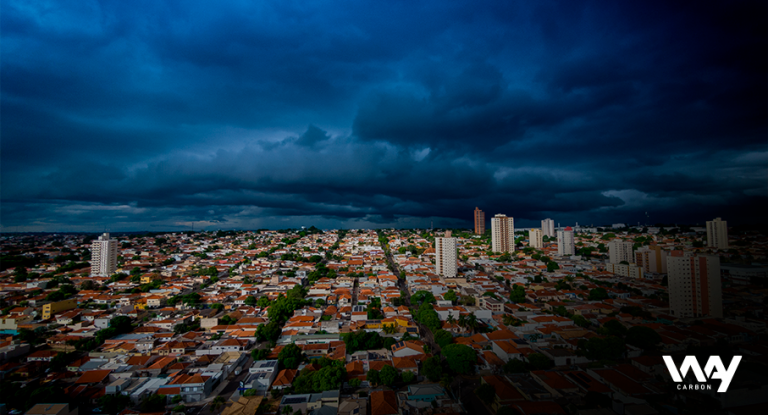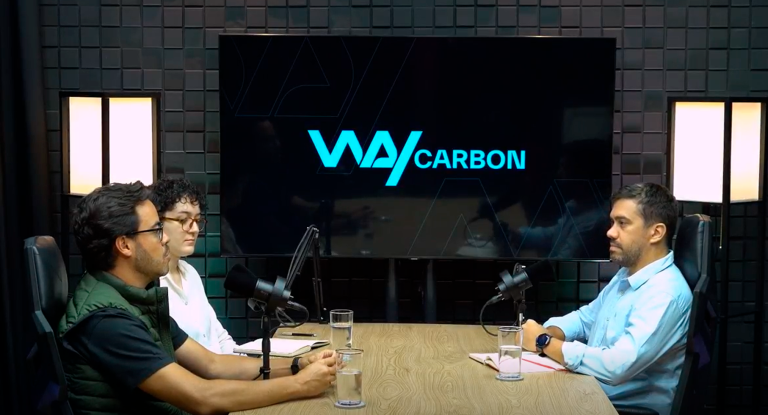11 examples: how are cities dealing with climate risks?

This year there have been many reports of floods caused by excessive rainfall in countries such as Brazil, Germany and the United Kingdom. According to the Intergovernmental Panel on Climate Change (IPCC), events such as these are already intensifying due to climate change.
Therefore, it is necessary to move away from the culture of response and towards the culture of preparation. In this sense, it is important for cities to map climate risks and adopt adaptation measures to avoid social, environmental, and economic losses. WayCarbon has already supported municipalities in several Brazilian regions in the development of Climate Action Plans, such as Belo Horizonte (MG), Recife (PE), Curitiba (PR) and Salvador (BA).
In terms of urban planning, Brazilian cities, as well as many others around the world. are not prepared for high volumes of rainfall, as explains Melina Amoni, Climate Risk and Adaptation Manager at WayCarbon, the largest strategic consultancy focused on sustainability and climate change in Latin America. “Climate resilience is a challenge for Brazil. We do not have a culture of preparation, but of response. Every year, with the arrival of the dry season, we seem to forget about the tragedies caused by summer rains. And in the next rainy season, we will have tragedies again. The same happens with the drought in the autumn and winter months, which is forgotten with the arrival of the rains”, explains the executive.
WayCarbon actively works to provide technical support for the development of Climate Action Plans, taking risk as a guiding factor for new investments in adaptation actions and has already worked in the following Brazilian cities:
1. Belo Horizonte (MG)
The capital of Minas Gerais launched, in 2016, the Climate Change Vulnerability Analysis. The threats of river flooding, vectors of arboviruses, heat waves and landslides, exposure and vulnerability for the current moment (2016) and future (2030) were evaluated throughout its territory. The analysis identified the 10 most vulnerable neighborhoods and the main challenges to be faced by the city to increase its adaptation capacity and reduce the population’s sensitivity. The Analysis was also used as a basis in the construction of adaptation actions in its Local Climate Action Plan, launched in 2022. Belo Horizonte has also been the setting for projects such as Urban LEDS, (“Promoting Low Carbon Urban Development Strategies in Emergemt Countries”), a partnership between ICLEI, UN-Habitat and the European Commission.
2.Betim (MG)
The city, through the identification of climate risks published in 2020, obtained clarity on the exposure and vulnerability linked to climate change, with studies on the threats of floods, meteorological droughts and vector-borne diseases. The analysis was part of the Urban-Leds II initiative, funded by the European Commission and implemented by ICLEI, which counted on WayCarbon to prepare the technical analyzes.
3.Curitiba (PR)
The plan was drawn up with the goal of reducing GHG emissions by 2050 and increasing the capacity to adapt to climate risks. To achieve this goal, there are more than 20 actions divided into five key sectors: environmental and urban quality, energy efficiency, solid waste and effluents, sustainable urban mobility, and urban hypervisor and innovation. The Curitiba Climate Change Mitigation and Adaptation Plan (PLANCLIMA) received technical assistance from the C40 Climate Action Program, from C40 Cities, as well as the plans for the Brazilian cities of São Paulo, Rio de Janeiro and Salvador.
4.João Pessoa (PB)
With the vision of a more resilient João Pessoa, neutral in carbon emissions, fair and inclusive by 2050, the city’s Climate Action Plan was launched in 2023. Consisting of 37 mitigation and adaptation actions, divided in 8 thematic axes: Mobility and Sustainable Transport; Urban Quality and Housing; Green Areas and Coastal Protection; Climate Risk Management; Sanitation and Health; Waste management; Inclusion and Reduction of Social Vulnerability; and Low Carbon Energy.
5.Recife (PE)
The Local Climate Action Plan of the city of Recife was launched in 2020 with the aim of achieving climate neutrality and creating socioeconomic opportunities, reducing poverty and inequality, improving people’s health and protecting nature. As a way of continuing, the city developed a Sectoral Adaptation Plan that was finalized in 2023 and will still be made available to the public. Aiming to build resilience, the Sector Plan included the analysis of climate risks and vulnerabilities and the development of adaptation actions for the Basic Sanitation, Urban Transformation, Urban Mobility and Economy sectors.
6.Rio de Janeiro (RJ)
Rio de Janeiro’s Sustainable Development and Climate Action Plan included the assessment of current (historical period) and future (2030 and 2050) climate risks in the city, focusing on threats of sea level rise, landslides, heat waves and floods. The city established 24 priority goals, with adaptation goals aimed at relocating people out of high-risk areas, improving emergency response and initiatives to increase the protection and well-being of the population.
7.Salvador (BA)
The city’s Climate Change Mitigation and Adaptation Plan is divided into four axes, equivalent to the four themes of the city’s future vision (Inclusive Salvador, Green-Blue Salvador, Low-Carbon Salvador and Resilient Salvador), and into 20 guidelines. Each of these guidelines is made up of actions whose results will help achieve the plan’s general goals: emissions neutrality, guaranteeing the universalization of water and sewage services, the reduction of the population living in risk areas, the renaturalization of rivers and the reduction of diseases caused by vectors by 2049.
8.São Bernardo do Campo (SP)
The 2021 study, financed by CAF (Development Bank of Latin America), combined elements of exposure and vulnerability of the population with analyzes of the incidence of each climate risk in the city, to identify the neighborhoods most affected by threats of flooding, landslides, heat waves and proliferation of vectors in the future scenarios of 2030 and 2050. Based on the results, a territorial adaptation strategy to the effects of climate change was developed, with the development of 12 measures with different deadlines implementation, in addition to description, main planned activities and indicators, priority neighborhoods, analysis of opportunities and the departments involved.
9.São Paulo (SP)
The plan, called PlanClima SP, was developed to respond to climate changes and guide the action of the municipal government in decision-making processes. The main goals are to undertake actions to reduce GHG emissions and implement measures to reduce social, economic and environmental vulnerabilities, with guiding points such as: journey towards zero carbon in 2050 and generation of sustainable jobs and income, increased supply of popular housing, reducing flooding, reducing vulnerabilities and strengthening Civil Defense, among others.
10.Sorocaba (SP)
The study, published in 2020, was also developed as part of the Urban-Leds II initiative, as in the city of Betim, based on risk analyzes of flooding, landslides, heat waves and the proliferation of vectors. From it, the city was able to identify the most vulnerable neighborhoods and the most critical areas for each risk, providing support for the development of effective adaptation measures.
11. Suape Strategic Territory
The Climate Action Plan was contracted by the Suape Port Industrial Complex for the Strategic Territory (composed of the 8 municipalities: Cabo de Santo Agostinho, Ipojuca, Moreno, Jaboatão dos Guararapes, Escada, Sirinhaém, Ribeirão, Rio Formoso ). Completed in 2023, it is yet to be made available to the public and contains proposals for mitigating and adapting to climate change for the strategic territory.
How to address climate risks in cities?
All of the projects cited above were supported by our consulting services and MOVE, an integrated digital platform for assessing risks associated with climate change, which produces baseline statistics on vulnerability and risks. Get in touch with our experts.
 EN
EN  ES
ES PT
PT





